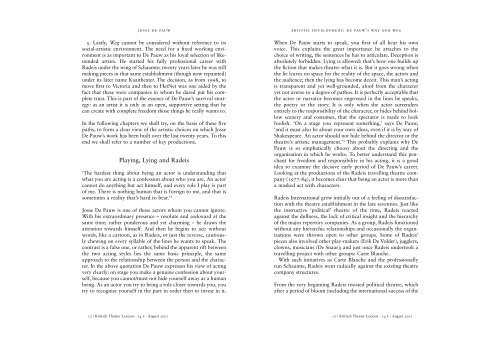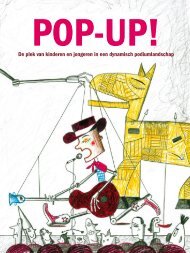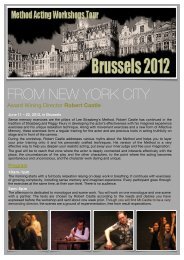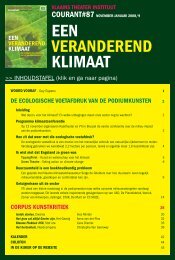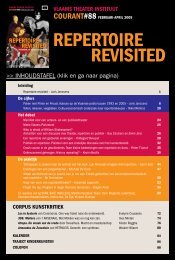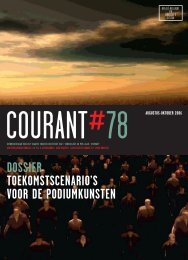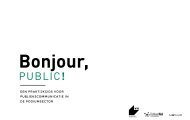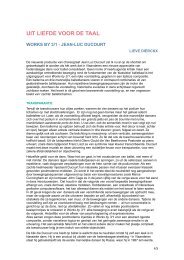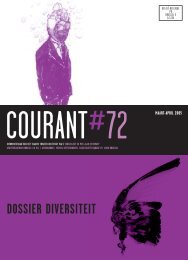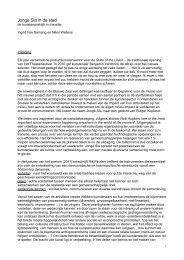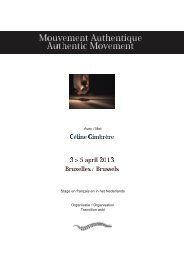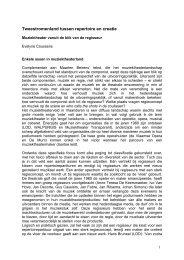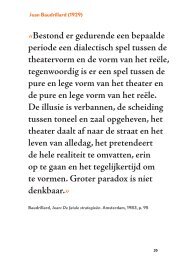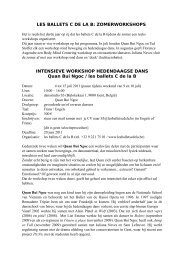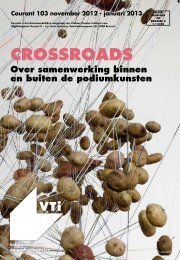You also want an ePaper? Increase the reach of your titles
YUMPU automatically turns print PDFs into web optimized ePapers that Google loves.
josse de pauw<br />
5. Lastly, Weg cannot be considered without reference to its<br />
social-artistic environment. The need for a fixed working environment<br />
is as important to <strong>De</strong> <strong>Pauw</strong> as his loyal selection of likeminded<br />
artists. He started his fully professional career with<br />
Radeis under the wing of Schaamte; twenty years later he was still<br />
making pieces in that same establishment (though now repainted)<br />
under its later name Kaaitheater. The decision, as from 1998, to<br />
move first to Victoria and then to HetNet was one aided by the<br />
fact that these were companies in whom he dared put his complete<br />
trust. This is part of the essence of <strong>De</strong> <strong>Pauw</strong>’s survival strategy:<br />
as an artist it is only in an open, supportive setting that he<br />
can create with complete freedom those things he really wants to.<br />
In the following chapters we shall try, on the basis of these five<br />
paths, to form a clear view of the artistic choices on which Josse<br />
<strong>De</strong> <strong>Pauw</strong>’s work has been built over the last twenty years. To this<br />
end we shall refer to a number of key productions.<br />
Playing, Lying and Radeis<br />
‘The hardest thing about being an actor is understanding that<br />
what you are acting is a confession about who you are. An actor<br />
cannot do anything but act himself, and every role I play is part<br />
of me. There is nothing human that is foreign to me, and that is<br />
sometimes a reality that’s hard to bear.’ 2<br />
Josse <strong>De</strong> <strong>Pauw</strong> is one of those actors whom you cannot ignore.<br />
With his extraordinary presence – resolute and awkward at the<br />
same time; rather ponderous and yet charming – he draws the<br />
attention towards himself. And then he begins to act: without<br />
words, like a cartoon, as in Radeis, or just the reverse, cautiously<br />
chewing on every syllable of the lines he wants to speak. The<br />
contrast is a false one, or rather, behind the apparent rift between<br />
the two acting styles lies the same basic principle, the same<br />
approach to the relationship between the person and the character.<br />
In the above quotation <strong>De</strong> <strong>Pauw</strong> expresses his view of acting<br />
very clearly: on stage you make a genuine confession about yourself,<br />
because you cannot/must not hide yourself away as a human<br />
being. As an actor you try to bring a role closer towards you, you<br />
try to recognise yourself in the part in order then to invest in it.<br />
12 / Kritisch Theater Lexicon - 14 e - August 2001<br />
artistic development: de pauw’s way and weg<br />
When <strong>De</strong> <strong>Pauw</strong> starts to speak, you first of all hear his own<br />
voice. This explains the great importance he attaches to the<br />
choice of writing, the sentences he has to articulate. <strong>De</strong>ception is<br />
absolutely forbidden. Lying is allowed: that’s how one builds up<br />
the fiction that makes theatre what it is. But it goes wrong when<br />
the lie leaves no space for the reality of the space, the actors and<br />
the audience; then the lying has become deceit. This man’s acting<br />
is transparent and yet well-grounded, aloof from the character<br />
yet not averse to a degree of pathos. It is perfectly acceptable that<br />
the actor or narrator becomes engrossed in the lines he speaks,<br />
the poetry or the story. It is only when the actor surrenders<br />
entirely to the responsibility of the character, or hides behind hollow<br />
scenery and costumes, that the spectator is made to look<br />
foolish. ‘On a stage you represent something,’ says <strong>De</strong> <strong>Pauw</strong>,<br />
‘and it must also be about your own ideas, even if it is by way of<br />
Shakespeare. An actor should not hide behind the director or the<br />
theatre’s artistic management.’ 3 This probably explains why <strong>De</strong><br />
<strong>Pauw</strong> is so emphatically choosy about the directing and the<br />
organisation in which he works. To better understand this penchant<br />
for freedom and responsibility in his acting, it is a good<br />
idea to examine the decisive early period of <strong>De</strong> <strong>Pauw</strong>’s career.<br />
Looking at the productions of the Radeis travelling theatre company<br />
(1977-84), it becomes clear that being an actor is more than<br />
a masked act with characters.<br />
Radeis International grew initially out of a feeling of dissatisfaction<br />
with the theatre establishment in the late seventies. Just like<br />
the instructive ‘political’ theatre of the time, Radeis reacted<br />
against the dullness, the lack of critical insight and the hierarchy<br />
of the major repertory companies. As a group, Radeis functioned<br />
without any hierarchic relationships and occasionally the organisations<br />
were thrown open to other groups. Some of Radeis’<br />
pieces also involved other play-makers (Erik <strong>De</strong> Volder), jugglers,<br />
clowns, musicians (<strong>De</strong> Snaar); and just once Radeis undertook a<br />
travelling project with other groups: Carte Blanche.<br />
With such initiatives as Carte Blanche and the professionally<br />
run Schaamte, Radeis went radically against the existing theatre<br />
company structures.<br />
From the very beginning Radeis resisted political theatre, which<br />
after a period of bloom (including the international success of the<br />
13 / Kritisch Theater Lexicon - 14 e - August 2001


